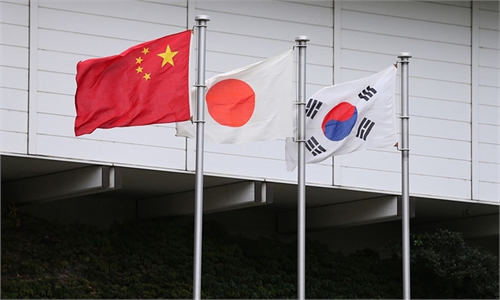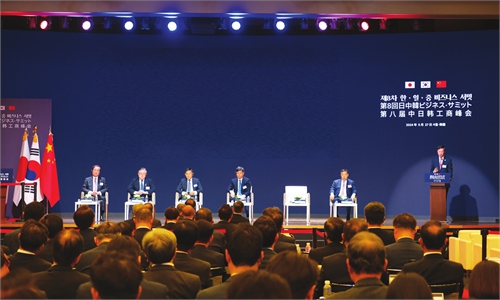China-Japan-South Korea leaders' meeting brings huge impetus to future economic and trade cooperation

Illustration: Xia Qing/GT
On Monday, the China-Japan-South Korea leaders' meeting resumed in Seoul, South Korea, four and a half years since the last meeting, bringing huge impetus to future economic and trade cooperation among the three countries.
Since December 2019, the global landscape has changed significantly. With this year's US presidential election and other political agendas, the political situation is expected to change this year as well. Against this backdrop, it is of great significance that the leaders of Japan, China and South Korea, all important East Asian countries, can gather again this summer to frankly exchange views on matters of concern.
Exploring economic and trade cooperation is one of the six major topics of this China-Japan-South Korea leaders' meeting. China has transformed from a manufacturing factory into a huge consumer market, with the content and processes of trade also changing to varying degrees. Previously, products manufactured in Japan were imported to China and directly provided to Chinese consumers. Now, to adapt to changes in the Chinese market, Japanese companies have started producing high-level, high-quality products in China for Chinese consumers.
Japan, China and South Korea are all major importers of natural gas. In promoting the development of green and clean energy in the future, the three countries can fully utilize their respective advantages and cooperate, which holds great potential. At the same time, many Southeast Asian countries heavily rely on coal. As pioneers, Japan and China can provide support tailored to the actual situation in Southeast Asia, different from Western models. Therefore, the cooperation among Japan, China and South Korea can also extend to other countries, contributing to Southeast Asia, Asia in general, and even the world.
Statistics show that the number of Japanese enterprises in China is 31,300, with Thailand ranking second with about 5,800. When Japanese companies, especially in the manufacturing sector, first came to China, they developed thanks to low labor costs and diligent workers, exporting products made in China to the world. Nowadays, although labor costs have increased, with the help of diligent and skilled Chinese workers, Japanese companies are still actively striving to cultivate the Chinese market. Today's China has a large, high-level consumer market, and Japanese companies, whether in manufacturing or non-manufacturing sectors, are unwilling to miss out on such a vast market.
Skilled laborers and a large, high-level consumer market are characteristics of China that are not yet present in Southeast Asia. Moreover, I believe that a major trait of Japanese companies is that if they can establish roots in China, they are willing to make efforts to deeply cultivate the Chinese market.
In fact, the economic circles of Japan and China have maintained a frequent exchange momentum. Early this year, a Japanese economic delegation composed of the Japan-China Economic Association, the Keidanren (Japan Business Federation) and the Japan Chamber of Commerce and Industry (JCCI) visited Beijing. A delegation from the Kansai economic community, with the Kansai Economic Federation serving as its core, is planning to visit China this November. Since this year marks the 40th anniversary of the friendship agreement between Liaoning Province and Toyama Prefecture, high-level government officials from both Liaoning and Toyama have conducted mutual visits.
When the Japanese economic delegation visited China in January of this year, they not only had the opportunity to exchange views frankly with Chinese leaders, but also held discussions with the National Development and Reform Commission, the Ministry of Commerce, and the Ministry of Industry and Information Technology. Leaders of the Japanese economic circles unanimously believe that the current Japanese society has not accurately conveyed the actual situation of China. Only by visiting China in person and interacting with the Chinese people can one truly understand the real China. I think other economic groups will also put visiting China on their agenda in the future.
If the Kansai Economic Federation delegation can visit China in November this year, I hope they will take this opportunity to visit Beijing and other cities, experience China's development speed, and truly understand the situation in various parts of China through close exchanges with their Chinese counterparts. Although exchanges between Japan and China were somewhat affected by the pandemic and other reasons, China continued to innovate and progress during that period. For example, in the field of digital information, China's technological development may have already surpassed that of Japan. Additionally, an industry known as the "low-altitude economy" has also begun to emerge in China. I believe Japanese companies need to thoroughly understand China's development trends and strive to develop a win-win relationship.
The author is the director of the Beijing office of the Japan-China Economic Association. opinion@globaltimes.com.cn


